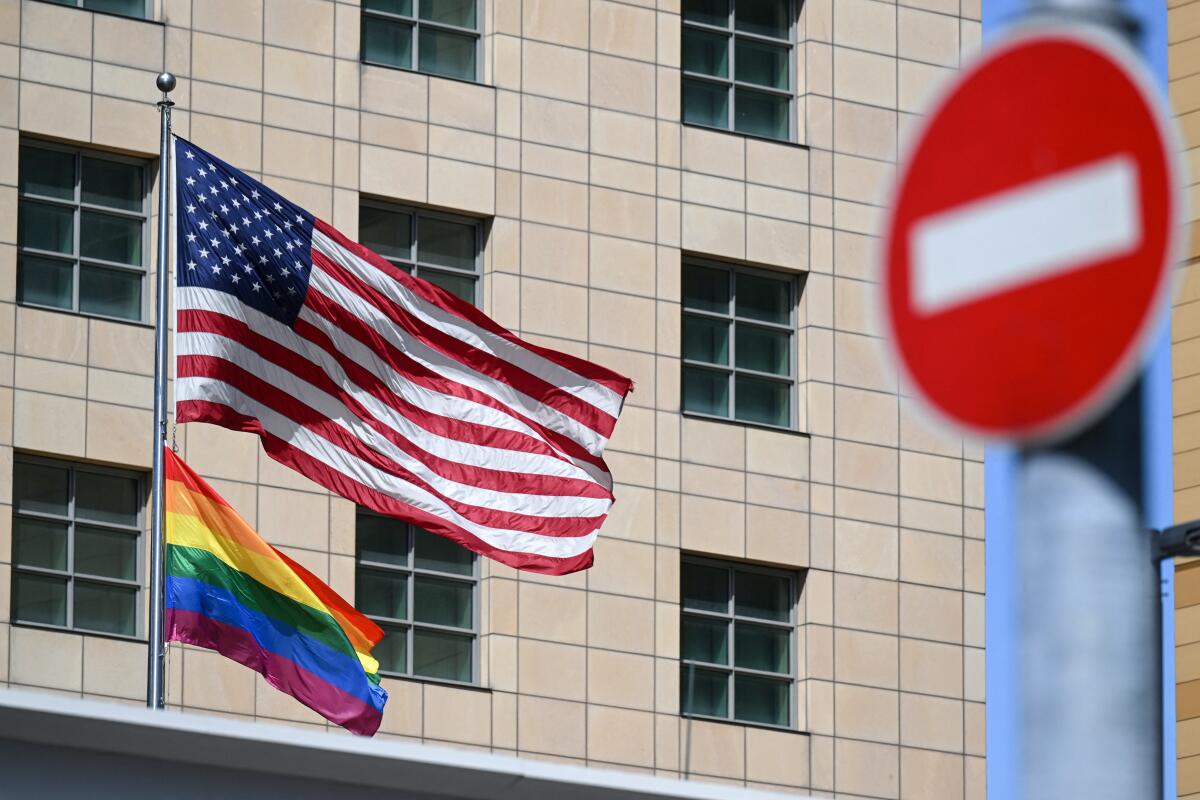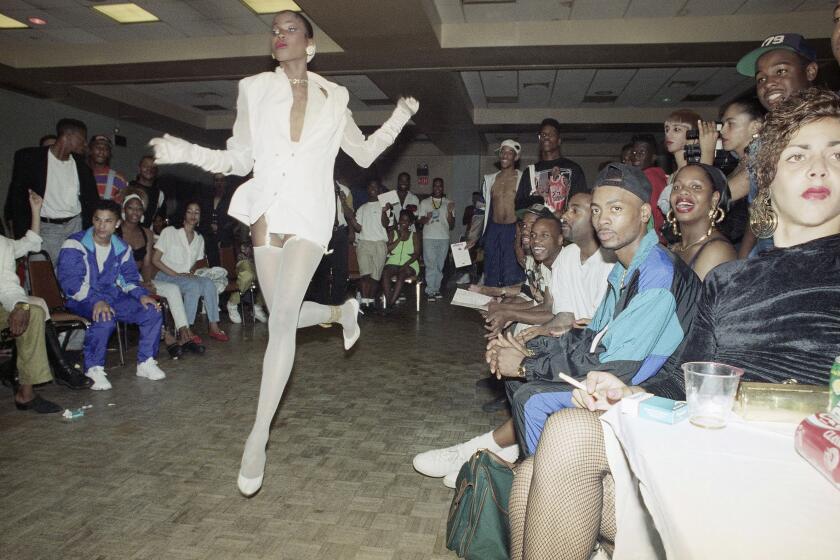Column: New ban on Pride flags at U.S. embassies is more than bad optics

- Share via
Less than two years ago I sat across from Antony J. Blinken as he spoke proudly of the work the State Department was doing to combat discrimination based on sexual orientation and gender identity around the globe. It was Pride 2022, and the secretary of State hosted a small group of out LGBTQ+ journalists at the department for a roundtable discussion.
Opinion Columnist
LZ Granderson
LZ Granderson writes about culture, politics, sports and navigating life in America.
“When I raise human rights issues, when I raise democracy issues, I often say to the people that we’re dealing with: It’s not exactly a secret that we have our own challenges that we’re working through at home,” he said. “We’re not trying to sweep the problem or the issue under the rug.”
The truth is we can’t sweep “the problem” under the rug. It is so omnipresent that even in the $1.2-trillion spending deal President Biden signed over the weekend, America’s conflict over LGBTQ+ people pulled focus. With famine in Gaza, with a migrant crisis on our own southern border, Republicans still made time to target queer people.
He has devoted his career to demeaning, endangering and imprisoning LGBTQ+ people. That’s the résumé House Republicans were looking for.
When Blinken held his symposium, the rainbow flag flew over U.S. embassies around the world to mark Pride Month.
No more.
A new ban, woven into the spending bill that Biden signed on Saturday, states that “none of the funds appropriated or otherwise made available by this Act may be obligated or expended to fly or display a flag over a facility of the United States Department of State.” Exceptions include POW/MIA flags or the sovereign flags of other nations. The Pride flag can still be displayed on the grounds, and the law doesn’t affect the State Department initiatives Blinken shared in 2022. The administration has already said that it will push to repeal this ban.
A documentary about drag balls made all the difference for me as a young gay man. Positive representation matters.
Who could possibly think that banning Pride flags should be a top priority at this moment?
While Ukraine was running low on ammunition to keep Russia’s invasion at bay, and after Russian President Vladimir Putin had casually threatened nuclear war, America’s elected officials spent their time this past week trying to figure out how to de-gay the world’s flagpoles during the month of June.
This was no zombie thriller moment, but a tender and brave dynamic to deepen our culture’s understanding of ourselves.
The camera-chasing, no-compromise Freedom Caucus wanted more: Nearly 50 anti-LGBTQ+ proposals ultimately were excluded from the budget deal. Just banning rainbow flags from flying at embassies appeased enough of the GOP members who were trying to avoid a government shutdown … you know, those patriots who just needed to be sure they were doing some damage to human rights while keeping the federal government open.
This is all too familiar. Within hours of taking office in 2017, Donald Trump had nearly every mention of the LGBTQ+ community removed from federal websites. House Speaker Mike Johnson built his law career defending anti-LGBTQ+ legislation. Elections have consequences, and I shudder to think what the consequences will be for queer people around the world if those two have their way.
“The problem” is global — and the U.S. will be a leader on the world stage, either toward liberty or repression. Most Americans, including most Republicans, now support LGBTQ+ rights, unlike 20 years ago, but the fight is far from over and the outcome is far from certain. There’s still an endless barrage of hateful legislation right here in the States. And since 1980, acceptance of LGBTQ+ people has fallen in 57 countries.
In more than 60 nations, same-sex relationships are a crime. Last year, the number of countries in which homosexuality is punishable by death rose to seven.
A rainbow flag waving high above a U.S. government site represents hope for a lot of people. Imagine what seeing that flag on our military bases in Afghanistan must’ve meant for closeted Afghans. Or at the U.S. Embassy in Botswana, which decriminalized same-sex relationships just a few years ago.
The federal budget is supposed to reflect our financial priorities. Surely no one imagines that raising rainbow flags at embassies is a problem because it’s expensive. It’s not. Those flags weren’t a problem at all; they were an opportunity. We’re in an election year, and conservatives wanted a piece of red meat to toss to their base while on the campaign trail.
Although Biden signed the budget bill, a White House statement condemned Republicans’ pandering: “It was inappropriate to abuse the process that was essential to keep the government open by including this policy targeting LGBTQI+ Americans. … We will continue to work with members of Congress to find an opportunity to repeal it.”
It’s encouraging to know the left is still looking for ways to raise the Pride flag, because in their war on LGBTQ+ people, conservatives clearly aren’t interested in raising a white flag.
More to Read
A cure for the common opinion
Get thought-provoking perspectives with our weekly newsletter.
You may occasionally receive promotional content from the Los Angeles Times.















